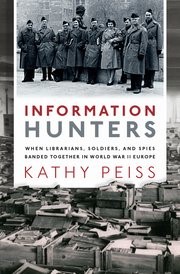Have you ever wondered about privacy and the data that operating systems, search engines, and social networks collect about you?

Would you like to research information about people, places, organizations or group, events, activities, or a capability? Do you need to locate a person or understand the culture of a place? Do you want to draw a detailed picture of an organization? Find out who is organizing an event? Understand a competitor’s progress on a project that might affect your business? Find classified documents that have been leaked onto the internet? Find potential employees with a specific skill set? Develop mastery at online searching? Find information that may have no authoritative source? Determine whether the information you have found is correct and timely?
If so, you might want to become an information detective! Information detection even has a professional name: Open Source Intelligence or OSINT. And luckily for you, Introduction to Open Source Intelligence for Information Professionals is taught at the iSchool, INST616, an introductory, practical course relevant to a variety of professions and applications including all forms of libraries, intelligence agencies, competitive intelligence, journalism, background investigations, reputation management, sales and marketing, ethical hacking/social engineering, and many others.
For the purposes of INST616, OSINT is defined as the use of free, publicly available online sources that can be used to gather information that may be later used to conduct analysis or reach conclusions. There are of course many other sources of open source information, some of requiring payment or subscription, and other forms not necessarily available on the web.
Have you ever researched a person’s name in a search engine and been offered a background check for $9.95? OSINT teaches how to save your $10.00. Students learn basic and advanced techniques for using search engines, people directories, social networks, location-based services, images and videos, public records, communities, classifieds, and many other sources. The course also offers students more technical aspects of open-source information, including domains, IP addresses, and website analytics.
Have you ever wondered about privacy and the data that operating systems, search engines, and social networks collect about you? To OSINT practitioners, privacy, data quality, and validation procedures are critical practices and these are taught in INST616 as well.
I’m the instructor! I have an MLIS from the Maryland iSchool and spent much of my career in large scale data management, information security, IT and data governance and compliance, and consulting. A few years ago, I was an IT consultant working in Mortgage Finance and other financial institutions. I then decided to become a registered Private Investigator in Virginia, and part of my PI training was a day of work in Open Source Intelligence. Because of my background I understood the importance of what I was learning and could see it evolving daily as I worked with the tools over the course of several years. My interests evolved to developing a process for conducting online profile audits for job seekers. I also care a lot about search literacy and hope to develop workshops to conduct in public libraries on the topic. Most people have very little idea how search engines work and why they get the results they do. I’d like to change that one group at a time.
All over the world, in all sorts of professions, people are conducting open source research. The idea of Open Source Intelligence is not new and did not begin with the web. For example, during World War II the United States deployed a group of Librarians to a number of cities in Europe to collect newspapers and technical documents as well as books and other publications that were then used for intelligence purposes. From the National Archives:
“While armies have seized enemy records and rare texts as booty throughout history, it was only during World War II that an unlikely band of librarians, archivists, and scholars traveled abroad to collect books and documents to aid the military cause. They collected enemy texts, followed advancing armies to capture records, and seized Nazi works from bookstores and schools…cultural historian Kathy Peiss reveals how book and document collecting became part of the new apparatus of intelligence and national security, military planning, and postwar reconstruction.”
The talk is available in this video. And the book is

Fast forward to today, where so much information is available at our fingertips. The problem is knowing where to find it and how to use it. The systems we usually consider only for our personal use are full of information about our OSINT targets: search engines, people directories, social networks, location-based services, images and videos, public records, communities, classifieds, registries, domain research tools, the list is almost endless and changes every day.
OSINT is best applied after professional training within an ethical construct, but can be applied to daily life problems involving personal and family matters as well. Traditional training is geared toward law enforcement, private Investigation, business due diligence, and defense and intelligence agency work although journalists and human resources professionals/recruiters also offer substantial insight and resources to the OSINT world and practices. An ISchool orientation is broader than these practices, and students learn to develop methodologies and applications of the tools to the widest variety of professions and information problems.
- Does my business competitor really have the capability it claims?
- I am a real estate investor: what is going on behind the scenes at a property I am trying to buy or sell?
- I received a solicitation in the mail which seems interesting, but I know nothing about the company.
- Who is operating this website I just saw a reference to and what are the affiliations? Are other websites associated with it?
- My grandfather left money to a distant relative and I would like to find her but have been out of contact for many years.
- I am thinking about joining an organization but would like to know more about the members.
- All I have is a phone number I wrote down and forgot the name
- Who are the extended family members of a person I am researching and what are their professions and activities?
OSINT can help us answer questions like these, and validation procedures provide us with context as to how certain we can be of our answers. I enjoy teaching this subject matter because throughout the semester everyone in the classroom learns from each other. People approach problems with different frameworks and technology choices, so research results can differ, demonstrating how teams may be more effective than a single individual depending on the project. The field changes daily which makes course development challenging. The topics are timely as tech companies and privacy concerns continue to make headlines.
So OSINT is a perfect way to round out your studies with techniques to find answers to questions when you can’t find a ready source of information about people, organizations or groups, places, businesses, capabilities, and events.
When you need to be an information detective.
By the way, there are other private investigators who began their careers with an MLIS on their resumes. Cynthia Hetherington of the Hetherington Group in New Jersey is a well-known investigator who teaches webinars on OSINT and created the very popular OSMOSIS Open Source Intelligence Conference. Marcy Phelps was a speaker at an early OSMOSIS conference. She also started her career with an MLIS degree and is now a well known researcher, certified fraud examiner, and has an excellent blog.
I’m delighted that the ISchool appreciates the role of open source intelligence in the information landscape and fortunate to work with the creative information detectives that join my class.